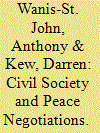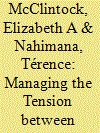|
|
|
Sort Order |
|
|
|
Items / Page
|
|
|
|
|
|
|
| Srl | Item |
| 1 |
ID:
082448


|
|
|
|
|
| Publication |
2008.
|
| Summary/Abstract |
Secret back-channel communication is often employed in severe conflict to explore the feasibility of front-channel negotiation. It can also be used as an adjunct to front-channel negotiation when talks become deadlocked or as a substitute for front-channel negotiation. Its value lies partly in the flexibility and future orientation it brings to talks. In the prenegotiation phase, it also provides political cover, is cost-effective, does not require formal recognition of the adversary, and allows communication with adversaries who do not meet preconditions for negotiation such as a cease-fire. Intermediaries and intermediary chains are sometimes used in back-channel communication. Heavy reliance on back-channel communication can produce flimsy agreements that are too narrowly based or fail to deal with major issues. But this problem can be avoided if enough time is spent assembling a broad central coalition
|
|
|
|
|
|
|
|
|
|
|
|
|
|
|
|
| 2 |
ID:
082447


|
|
|
|
|
| Publication |
2008.
|
| Summary/Abstract |
The fact that civil society groups play important roles in post-conflict peacebuilding has entered the mainstream of international conflict resolution dogma. Rarely do local civil society groups get a seat at the negotiation table for peace accords. Although the exclusion of civil society from peace negotiations may streamline the process, the absence of civil society voices and interests at the negotiating table can negatively impact the sustainability of a peace agreement during peacebuilding. Surveying a wide variety of different peace processes, a strong correlation was found between active civil society participation in peace negotiations and the durability of peace during the peacebuilding phase. Cases in which civil society groups actively engaged in peace negotiations seemed to enjoy more sustained peace in the peacebuilding phase. This holds true also for cases in which civil society groups did not have a direct seat at the table, but did exercise significant influence with the negotiators because they were democratic actors. War resumed in many cases not characterized by direct or indirect civil society involvement in the peace negotiations. No claim of causality is made; the sustainability of peace surely rests on causes as complex and dynamic as the initiation of war does. However, these findings do call attention to the need for further research to understand the special impact that civil society inclusion at the peace table may have
|
|
|
|
|
|
|
|
|
|
|
|
|
|
|
|
| 3 |
ID:
082452


|
|
|
|
|
| Publication |
2008.
|
| Summary/Abstract |
This article explores the import of the network society for conflict resolution, broadly defined. Defining networks as social structures which connect people to each other, the article highlights the dual potential impacts of networks on participation in conflict resolution processes. Network society discourse creates a discourse of inclusion while also offering opportunities for exclusion. Conflict resolution theory has embraced the inclusive potential of network dynamics both implicitly and explicitly. Peacebuilders use networks, with their potential for participation and connecting conflict resolution processes, levels, and sectors, in efforts to do their peacebuilding work better. However, not all networks support conflict resolution. Networks can also reinforce conflicts, institutionalize exploitation, exacerbate inequalities, and strengthen violent conflict movements. Networks can be distinguished as inclusive or exclusive. Inclusive networks are more suitable for supporting meaningful participation in conflict resolution processes, while exclusive networks entrench conflict. Vibrant networks incorporate more inclusive and more exclusive dynamics in network vitality that allows both flexibly incorporating diversity and developing clarity of focus that inevitably delineates areas (or people or activities) outside the area of focus. Meaningful inclusion and participation in conflict resolution negotiations is broadly possible through inclusive networks, but forms of exclusion from conflict resolution negotiations are equally possible outgrowths of exclusive networks
|
|
|
|
|
|
|
|
|
|
|
|
|
|
|
|
| 4 |
ID:
082450


|
|
|
|
|
| Publication |
2008.
|
| Summary/Abstract |
The tension between inclusive and exclusive approaches is present throughout peace processes. The challenge of facilitators, mediators, and parties alike is to determine how to manage these tensions, how to integrate various processes into a comprehensive whole and ensure that those required to implement the peace agreement have access to the process that creates the peace agreement. In particular, how can civil society, an actor of ever-increasing importance in the implementation of peace agreements, be effectively included in the design of the accords? This article examines the tension between inclusive and exclusive processes within the context of the Burundi peace process and the development of the Arusha Peace Accords.
|
|
|
|
|
|
|
|
|
|
|
|
|
|
|
|
| 5 |
ID:
082449


|
|
|
|
|
| Publication |
2008.
|
| Summary/Abstract |
Peace negotiators concentrate their mediation efforts on leaders of armed factions in their pursuit of political agreements to stop a civil war, and they exclude noncombatants and interest groups that can "spoil" the bargaining. This practice of exclusion often creates agreements that fail during implementation. Track two diplomacy efforts can overcome this failure by providing channels to include other interest groups and active parties. In Tajikistan, participants in a sustained dialogue intervention provided crucial influence to the negotiation of a civil war settlement, but the agreement itself only created a greater centralization of political power and institutions that excluded public political participation. However, participation in the dialogue transformed members and even some observers into effective practitioners developing a large number of public associations committed to conflict resolution. Therefore, the Inter-Tajik Dialogue in Tajikistan illustrates a successful strategy for overcoming the dynamics of exclusion that drive political settlements between military leaders. More importantly, sustained dialogue demonstrates possible strategies for building peace by stimulating the development of a more inclusive civic culture
|
|
|
|
|
|
|
|
|
|
|
|
|
|
|
|
| 6 |
ID:
082446


|
|
|
| 7 |
ID:
082451


|
|
|
|
|
| Publication |
2008.
|
| Summary/Abstract |
This article explores whether and how civil society engagement in a peace process can 'ripen' the conditions and facilitate the success of a peace process. The activities and methods of the Inter-religious Council of Sierra Leone are examined for their impact on each stage of the peace process with a view to shedding light on how civil society can help create the ripe conditions for formal peace negotiations, be an effective participant in negotiations, as well as improve the sustainability of a peace agreement
|
|
|
|
|
|
|
|
|
|
|
|
|
|
|
|
|
|
|
|
|